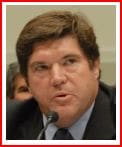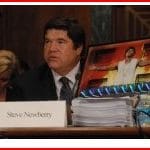
Commonwealth CEO Steve Newberry has been involved in radio’s royalty fight for nearly a decade. He’s testified several times before Congress (he’s also a former NAB Joint Board Chair) and has been involved in dozens of meetings on this topic. He’s one of the radio’s best experts on the topic with backpacks full of knowledge on every angle of this issue. He tells Radio Ink this new bill put forth by Darrell Issa and Ted Deutch isn’t going anywhere, and radio has long been the number one source of new music exposure and has been a key partner in America’s music industry being the most successful in the world. We interviewed Newberry, Thursday, to help you understand and deal with this issue as best you can.
Radio Ink: What are your thoughts on this latest attempt at imposing a royalty on radio?
Newberry: This seems to be more of the same from the recording industry. Record labels have seen their profit margins shrink and want to make up the difference on the backs of local radio stations.
Radio Ink: What are the chances this PROMOTE Act passes?
Newberry: This bill isn’t going anywhere. Any attempt to pass the PROMOTE Act would be met with strong resistance in both the House and the Senate. Just look at the number of cosponsors for the Local Radio Freedom Act and you’ll appreciate the support local radio has from lawmakers who believe in its promotional value to the recording industry. Lawmakers understand the devastating impact a performance royalty would have on their hometown radio stations and, in turn, their constituents.
Radio Ink: Do you believe most artists want something like this to be enacted or most believe that radio is helping them sell more music and put butts in seats at concerts?
concerts?
Newberry: At every awards show, artists praise radio for jumpstarting their careers, for getting listeners to buy their albums, for driving ticket sales. Performing artists want to be on radio because they know that is where the audience is.
Radio Ink: What would happen to radio stations if they had to pay this new fee?
Newberry: The bill would make music licensing much more complicated and listeners would be the ones truly suffering. I think you would see less music being played on the radio as more stations adopt a News/Talk format. Small-town broadcasters would be deeply impacted because they would face an uphill battle in negotiating with massive, foreign record labels. Songwriters’ rights would also diminish because record labels would gain new veto power over what music gets played on the radio.
 Radio Ink: What would you advise radio stations to do?
Radio Ink: What would you advise radio stations to do?
Newberry: They should continue meeting with their Members of Congress, either when they’re back in their district or in Washington. The best way to make sure Members of Congress understand the harm a performance royalty can have on local radio, jobs, and economic growth is by explaining it to them face-to-face. Invite them to your stations to show them how any new royalty would affect your ability to make payroll or invest in new equipment or sponsor a charity drive. Make elected officials appreciate the role radio plays in every community in the country.
Reach out to Steve at [email protected]






What this new royalty idea ignores is broadcast radio is the primary driver of fans to concerts. Ask any promoter. He could buy advertising, but it’s cheaper and easier to do ticket give-aways on broadcast radio. Can’t really do them on Spotify or Pandora. Can’t do them on Sirius.
So if concerts are the primary source of money for artists and labels, and broadcast radio is the tool that drives people to those concerts, why would artists want to take their music off broadcast radio?
This makes about as much sense on paying actors for mouthing a screenplay that somebody else wrote. It’s not radio’s fault that it’s harder to make money from recording music. Concert ticket sales and merchandising have taken their place as revenue generators for performers. Artists have the ability to opt out of the music business if they don’t like it. As long as we can charge the artist for the airtime then it’s okay. WAIT! Isn’t that payola??? Let’s even the playing field then if we gotta pay to play then SO DO THEY!!!